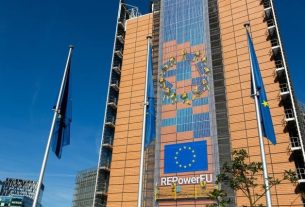In the wake of increasingly erratic and devastating natural disasters, a worldwide focus on climate change and the development of preventative measures has become a global priority. The struggle to tackle climate change is one of the defining characteristics of the 21st century. Another defining characteristic is the development of increasingly complex and ground-breaking technologies. These two key elements of this generation, whilst predominantly explored separately, can be combined in order to further the global handling of the climate emergency. Blockchain technology, which functions as a shared ledger for tracking and sharing assets and transactions, has been praised for its facilitation of a more secure, accessible, and transparent approach for the business and private sectors. Although blockchain technology is usually associated with and applied to the business sector, this technology can actually prove an extremely useful tool in the battle against climate change, especially in a European context.
Blockchain technology has traditionally been associated with the negative connotations relating to how cryptocurrency mining can be harmful for the environment, leading to the mistaken impression that blockchain cannot be a positive force in the fight against climate change. In actuality, blockchain technology can aid the efficiency, transparency and success of business and government efforts to reduce the effects of climate change in several valuable ways.
The EU is an outspoken public supporter of the implementation of blockchain technology in the battle against climate change and should serve as a positive example for those sceptical of its merits. As an increasingly green-focused organisation, the EU are taking active steps to incorporate blockchain technology into their climate change strategy in several ways. In collaboration with other international entities such as the UN and the World Bank, the EU are taking necessary measures to encourage businesses and national governments to follow in their footsteps.
They are developing programs to support the shift to blockchain technology for businesses, which includes investment programs supporting blockchain led strategies for climate change mitigation and adaption. They are also supporting national governments in the development of blockchain strategies toward climate strategies and reducing greenhouse gas emissions. However, European businesses and national governments remain hesitant to fully embrace this new technology. This hesitation could prove detrimental for the environment. In the midst of such a climate emergency, action must be swift and united.
It is essential that European businesses recognise the merits of blockchain technology in their role in the fight against climate change. The implementation of Blockchain technology into the operation of European business transactions is useful in enhancing the efficiency of international carbon emissions trading. The decentralised and digitised nature of blockchain ledgers makes it easier to track carbon credits as digital tokens, which can be easily tracked and traded between businesses globally. This leads to enhanced climate finance flows and improved carbon asset transaction systems. This provides a more efficient and streamlined process for businesses, ensuring compliance with climate legislation in a simple and effective way.
European national entities and organisations should also look to the EU’s example as using blockchain technology to construct efficient climate change strategies in the public sector would also be hugely beneficial for the European approach to the climate crisis. If Blockchain technology was implemented by governments across Europe, and globally, it would be a useful tool in monitoring and tracking individual countries’ commitments to the implementation of international climate agreements such as the Nationally Determined Contributions element of the Paris Agreement. The United Nations Climate Change secretariat (UNFCCC) promote the use of this technology, stating that UN member countries must “make use of all innovative and cutting-edge technologies available. Blockchain could contribute to greater stakeholder involvement, transparency and engagement and help bring trust and further innovative solutions in the fight against climate change, leading to enhanced climate actions.”
The nature of blockchain’s ’block’ technology system allows for a more transparent and reliable reflections of green transactions and emission data. This allows governments to track their emissions data more effectively in a decentralised and unchangeable ledger. By extension, this also enables policymakers within global institutions such as the UNCCC to have an accurate interpretation of the international community’s commitment to climate agreements, whilst highlighting areas or locations which require further incentivisation.
Emerging blockchain technology is changing the face of strategies tackling climate change, which is implemented to a high level of success in various contexts. The EU’s integration of blockchain technology into their approach toward the climate emergency should stand as a positive example which both businesses and nations worldwide should follow. The ease at which blockchain is able to improve efficiency, transparency and access to carbon data, transactions and information is not something which the world can afford to ignore. The climate crisis is escalating at an alarming level, and the world must take advantage of new technology which helps equip us with the means to tackle the crisis as productively as possible.





